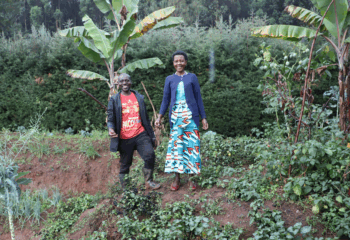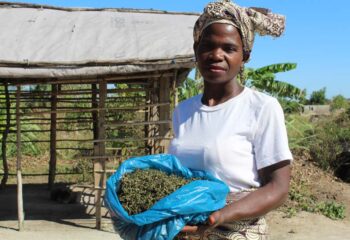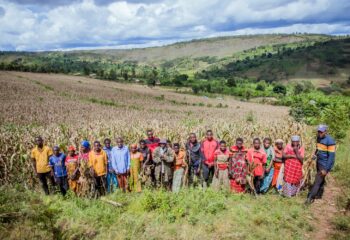Pauline Fadonougbo, a 41-year-old mother of four, is the president of a group of women processors in the village of Zoungo, commune of Ouinhi, in Benin. This group, named Soedja (i.e., “we have confidence in the future”), has worked in the cassava and palm oil sectors for 22 years. The group is composed of eight women who process cassava into gari1 and palm nuts into palm oil. Prior to 2015 the processing of cassava into gari was done in the field without a processing machine. The cassava was peeled, washed with water from the lagoon, crushed, squeezed, and then cooked without observing hygienic practices. The resulting gari was very low quality and sold at a low price.
In June 2016, Pauline was informed of a training on improved cassava processing techniques to make Gari Souhoui, tapioca enriched with coconut milk, soy, pineapple, and other ingredients. This training was carried out by the Mèdjro group with the support of IFDC’s ACMA program. Mèdjro has developed expertise in the production of improved Gari Souhoui. The ACMA2 program supports this group in networking with other gari producers in the area to facilitate group sales to meet the growing demand of the Nigerian and Beninese markets. Trainings are now regularly organized by Mèdjro with the support of the ACMA2 program.
“I narrowly missed the training given by Mèdjro in June 2016. When those who benefited came to give us a little update of the concepts learned, I immediately understood that I absolutely had to do it. The quality of my gari had to be improved. So, I moved to Dasso and did not hesitate to pay 50,000 FCFA to learn to make Gari Souhoui and to find out how to benefit from the training…
[When I learned the new technique,] it was like leaving darkness for the light.”
After this training, Pauline and the other members of the group built a shed and mobilized the necessary equipment to set up their processing unit in the village center near their homes. Then she began putting her newfound knowledge into practice. To increase her chances for success, she asked for and was granted a recycling session with Mèdjro, this time accompanied by three other members of her group. To ensure the quality of Gari Souhoui produced by her group, Pauline has requested multiple inspections by the president of Mèdjro. The quality of gari and tapioca produced by Soedja has improved considerably over time.
“Our gari is no longer sluggish in the market. It sells better. We even participated in fairs with the support of ACMA, and we have established business relations with buyers in Benin and Nigeria.”
But Pauline did not become complacent; she then acquired skills in producing improved gari enriched with coconut milk, pineapple, and other additives. With the enlightened leadership of Pauline, Soedja grew in knowledge and production capacity. Sohoui-enriched gari became their dominant activity. Thus, the group strengthened its cassava processing equipment and derived products. The added value and turnover of the improved Gari Souhoui both increased.
The group has been accessing new markets for a while. Between July 2017 and September 2018, the group sold 75 tons of Gari Souhoui. In August 2018, the group participated in the Independence Fair in Cotonou, where it realized sales of improved gari coco to four Nigerian customers for 1.35 million FCFA.
The next step for the group will be to implement a modern processing unit to pursue certification of their gari. This should not be difficult as Pauline and her group are among the best processors of Gari Souhoui in the Agonlin region (Ouinhi).



